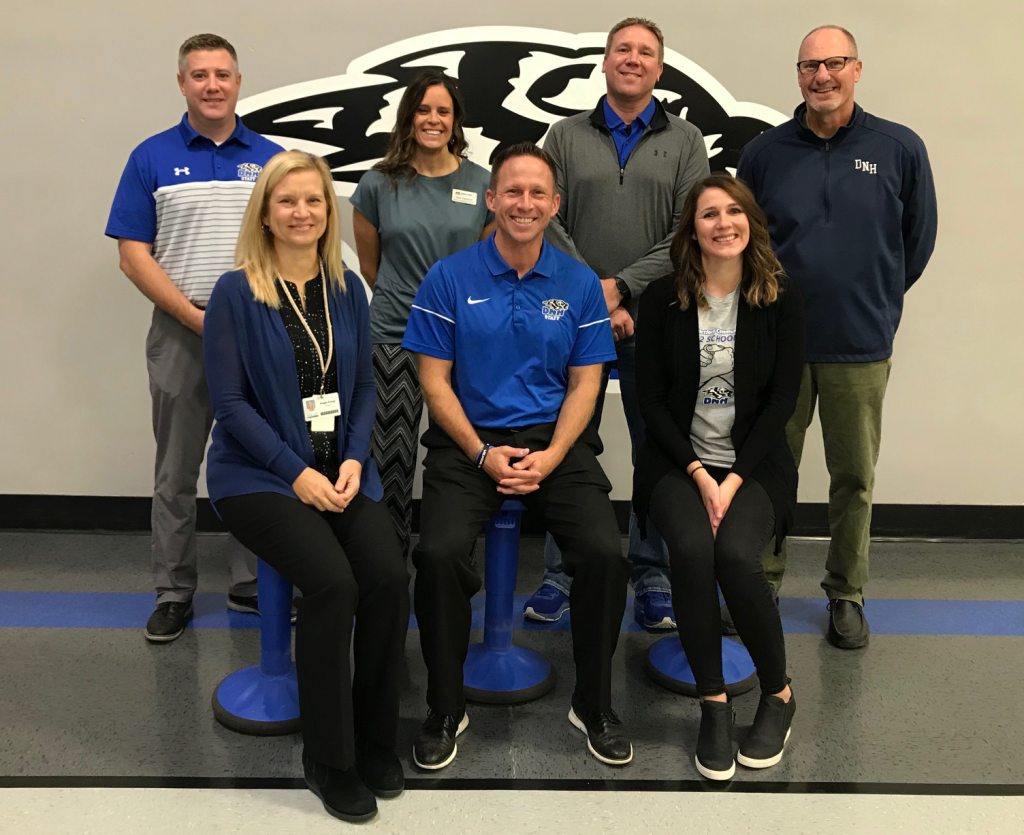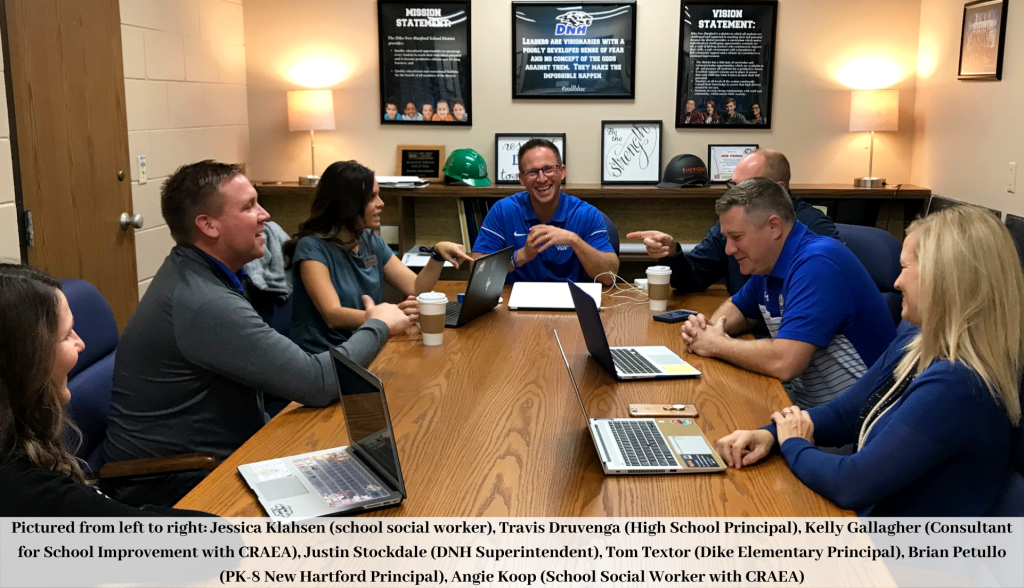
Central Rivers AEA Collaborates with Leadership from Dike-New Hartford Schools to Expand Mental Health Supports for Students
Everybody has problems, so don’t face them alone. All it takes is an open conversation. That’s the mindset at the Dike-New Hartford Community School District, where two years ago, district leadership saw a need to make it comfortable to talk about student mental health. They’ve never looked back.
It all started with an increase in the number of students visiting the school counselor’s office every day. Justin Stockdale, DNH Community School District superintendent, began talking to students who were giving clear messages about a need for mental health, diversity and inclusion support. Central Rivers Area Education Agency (CRAEA) staff, Kelly Gallagher, Angie Koop and Rusti Sparks began working alongside Stockdale and the school district’s leadership team to gather and analyze student data to create mental health initiatives, a major focus area for the agency.
To know what mental health initiatives needed to be implemented, Stockdale, the district leadership team and CRAEA partners looked to the data. “After the conversations I had with students, I knew we had work to do,” said Stockdale. When district brainstorming began, these questions were asked:
- What exactly does the data show?
- What ideas have worked in other districts?
- What is DNH about – what are the foundational and universal values at DNH?
- What systems do we have in place that could drive the work?
- Are we on the right track at DNH?
“We were focused on the systemic implementation of the Positive Behavioral Interventions and Supports (PBIS) model and everyone in our district embraced it.”
Kelly Gallagher, Consultant for School Improvement with CRAEA, helped with the analysis. “Emotional safety was an area of focus,” said Gallagher. Following this recognition, Gallagher and the district leadership staff dug deeper into the student-to-student relationship data. One particular indicator that stood out was students in school respecting each other’s differences (gender, race, culture, learning differences, sexual orientation, etc.), showed an area for growth. The brainstorming began on how school leaders could work with the teachers and staff to ensure a consistent and universal system of support for all DNH students, PreK-12. “It shouldn’t matter which DNH building you’re in, the supports need to be consistent,” said Stockdale.
Angie Koop, School Social Worker with CRAEA, brought the mental health background to assist with breaking down the data through a social work lens. “A student’s social and emotional wellbeing directly impacts their student success,” said Koop. “The more we can positively impact students’ social/emotional skills, the more we improve their academic success.”
Rusti Sparks, Special Education Consultant with CRAEA, brought a deep knowledge of the Multi-tiered Systems of Support (MTSS) to help students. “The research is clear; students must feel safe to have optimal learning environments,” said Sparks. “My role is to listen to what the needs are for the DNH schools, provide those resources and support the learning.” Through the use of Social and Emotional Learning (SEL) competencies, Collaboration, Access, Review and Education (CARE) Teams, Social, Academic and Emotional Behavior Risk Screener (SAEBRS) and the Multi-Tiered Systems of Support of Social, Emotional, Behavior, and Mental Health (MTSS for SEBMH) framework provided by CRAEA, a collaborative and successful initiative was born.
A key component to the success of the DNH initiative was and continues to be leadership. “All of the DNH principals have been dedicated agents of change,” said Gallagher. “For mental health initiatives to be successful in the school, you must have leadership in the district that’s willing to sit at a table and make a change – leadership that’s comfortable with being uncomfortable and ready to address issues.”
The partnership with CRAEA has been extremely helpful in providing DNH schools professional learning and resources focused on providing students optimal learning experiences. “Being able to call the AEA and get connected with someone who is an ‘expert’ in a certain role/area to assist us properly has been invaluable,” said Stockdale. “Mental health conversations are a sign of strength – they’re conversations that must be had. This is a fight that’s global. If you don’t embrace it, you’re missing out on a key conversation that could pave the way for critical support many students desperately need.”
There is a need for mental health awareness and initiatives in every district. Schools that wish to launch similar programs need to know a few important details:
- Take that first step to get started and talk to your students.
- Support from your administration is key – without it, getting a program launched off the ground is virtually impossible.
- The data tells you what your needs are. Be sure to study and analyze it.
- Things change every year, therefore your needs will be different. Look at the data every year, from multiple sources, and update your initiatives as needed.
- Keep track of your initiative’s strengths, processes and areas of need.
- Contact your local AEA to help guide you through the process and get the proper resources and people involved.
For more information on the success of DNH’s wellbeing initiatives or how CRAEA can support districts, contact Ryan Andreassen, CRAEA Regional Administrator at randreassen@centralriversaea.org or Justin Stockdale, DNH Superintendent at jstockdale@dnhscd.org.

